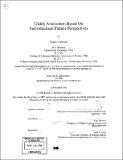| dc.contributor.advisor | Peter Szolovits. | en_US |
| dc.contributor.author | Steward, Duane A. (Duane Allen), 1954- | en_US |
| dc.date.accessioned | 2010-01-07T20:47:00Z | |
| dc.date.available | 2010-01-07T20:47:00Z | |
| dc.date.copyright | 1998 | en_US |
| dc.date.issued | 1998 | en_US |
| dc.identifier.uri | http://hdl.handle.net/1721.1/50506 | |
| dc.description | Thesis (Ph. D.)--Massachusetts Institute of Technology, Dept. of Electrical Engineering and Computer Science, 1998. | en_US |
| dc.description | Includes bibliographical references (p. 203-211). | en_US |
| dc.description.abstract | The feasibility of using the terminology of the individual patient to capture and express the individual's particular, perhaps unique, value system for healthiness is explored as a means to evaluate the quality of life. The hypothesis is that a systematic approach that treats the patient as a competent expert on a patient's perception of what it means to be healthy is a viable approach to his or her values. It is anticipated that eliciting such knowledge in a form that health care providers can use will enhance medical decision making. A systematic and rigorous protocol is described consisting of a reconstruction of utility assessment using traditional methodological building blocks applied to the descriptors elicited from the individual. The representation of values is multidimensional. Ordered nominal scales are constructed from the words of the individual's description of familiar people in a structured interview. A complete list of comprehensive scales is composed as indicated by the responses of the individual to hypothetical decisions involving tradeoffs. The result is a scoring system for health state descriptions suitable to represent values for the outcomes in medical decision models constructed by the medical community. The output is a patient preference model referred to as an Individualized Multidimensional Quality of Life (IMQOL) model. This model also provides a means to describe and rank potential outcomes from the same individualized perspective. Feasibility is explored by empirical evaluation of sixteen interviews of dialysis patients with the IMQOL protocol and applying the resulting model to the patient's own health as well as four other states of health common in dialysis therapy. Comparison is made to results of quality of life assessment with standard gamble and time tradeoff methods in the same patients for the same described outcomes. Qualitative responses from patients regarding their confidence in the representation of their values are rewarding. Results are quantitatively comparable to traditional utility assessment. A prototypic computer program is used to substantiate the programmability and potential for automation. The protocol expands the information contributing to understanding by both the health care provider and the patient. Future evaluation and extension are discussed. | en_US |
| dc.description.statementofresponsibility | by Duane A. Steward. | en_US |
| dc.format.extent | 263 p. | en_US |
| dc.language.iso | eng | en_US |
| dc.publisher | Massachusetts Institute of Technology | en_US |
| dc.rights | M.I.T. theses are protected by
copyright. They may be viewed from this source for any purpose, but
reproduction or distribution in any format is prohibited without written
permission. See provided URL for inquiries about permission. | en_US |
| dc.rights.uri | http://dspace.mit.edu/handle/1721.1/7582 | en_US |
| dc.subject | Electrical Engineering and Computer Science | en_US |
| dc.title | Utility assessment based on individualized patient perspectives | en_US |
| dc.type | Thesis | en_US |
| dc.description.degree | Ph.D. | en_US |
| dc.contributor.department | Massachusetts Institute of Technology. Department of Electrical Engineering and Computer Science | en_US |
| dc.identifier.oclc | 42352460 | en_US |
